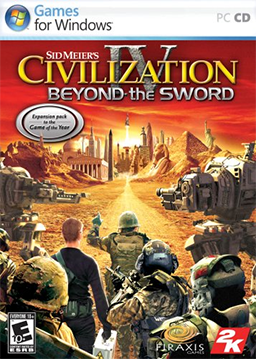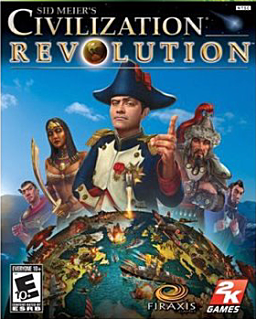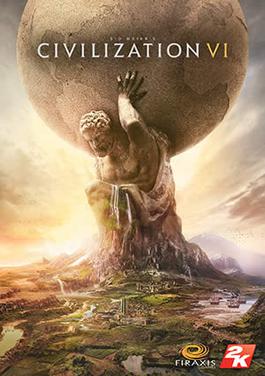
Sid Meier's Alpha Centauri is a 4X video game, considered a spiritual sequel to the Civilization series. Set in a science fiction depiction of the 22nd century, the game begins as seven competing ideological factions land on the planet Chiron ("Planet") in the Alpha Centauri star system. As the game progresses, Planet's growing sentience becomes a formidable obstacle to the human colonists.

Sid Meier's Civilization is a 1991 turn-based strategy 4X video game developed and published by MicroProse. The game was originally developed for MS-DOS running on a PC, and it has undergone numerous revisions for various platforms. The player is tasked with leading an entire human civilization over the course of several millennia by controlling various areas such as urban development, exploration, government, trade, research, and military. The player can control individual units and advance the exploration, conquest and settlement of the game's world. The player can also make such decisions as setting forms of government, tax rates and research priorities. The player's civilization is in competition with other computer-controlled civilizations, with which the player can enter diplomatic relationships that can either end in alliances or lead to war.

Sidney K. Meier is a Canadian-born Swiss-American businessman and computer programmer. An active programmer, designer, and producer of several strategy video games and simulation video games, including the Civilization series, Meier co-founded MicroProse in 1982 with Bill Stealey and is the Director of Creative Development of Firaxis Games, which he co-founded with Jeff Briggs and Brian Reynolds in 1996. For his contributions to the video game industry, Meier was inducted into the Academy of Interactive Arts and Sciences Hall of Fame.

Sid Meier's Civilization II is a turn-based strategy video game in the Civilization series, developed and published by MicroProse. It was released in 1996 for PCs, and later ported to the PlayStation by Activision.

Firaxis Games, Inc. is an American video game developer based in Sparks, Maryland. The company was founded in May 1996 by Sid Meier, Jeff Briggs and Brian Reynolds following their departure from MicroProse, Meier's earlier venture. They were acquired by Take-Two Interactive in August 2005, and subsequently became part of the publisher's 2K label. Firaxis Games is best known for developing the Civilization and XCOM series, as well as many other games bearing Meier's name.

4X is a subgenre of strategy-based computer and board games, and includes both turn-based and real-time strategy titles. The gameplay generally involves building an empire. Emphasis is placed upon economic and technological development, as well as a range of military and non-military routes to supremacy.

Civilization IV is a 4X turn-based strategy computer game and the fourth installment of the Civilization series, and designed by Soren Johnson under the direction of Sid Meier and his video game development studio Firaxis Games. It was released in North America, Europe, and Australia, between October 25 and November 4, 2005, and followed by Civilization V.
Civilization is a series of turn-based strategy video games, first released in 1991. Sid Meier developed the first game in the series and has had creative input for most of the rest, and his name is usually included in the formal title of these games, such as Sid Meier's Civilization VI. There are six main games in the series, a number of expansion packs and spin-off games, as well as board games inspired by the video game series. The series is considered a formative example of the 4X genre, in which players achieve victory through four routes: "eXplore, eXpand, eXploit, and eXterminate".

Sid Meier's Civilization IV: Beyond the Sword is the second expansion pack of the turn-based strategy video game Civilization IV. The expansion focuses on adding content to the in-game time periods following the invention of gunpowder, and includes more general content such as 11 new scenarios, 10 new civilizations, and 16 new leaders.

Sid Meier's Civilization Revolution is a 4X, turn-based strategy game developed in 2008 by Firaxis Games with Sid Meier as designer. It is a spin-off of the Civilization series. The video game was released for the PlayStation 3, Xbox 360, Nintendo DS, Windows Phone, and iOS. A Wii version was originally expected but was cancelled. The absence of a PlayStation Portable version was attributed to a lack of development manpower.

Sid Meier's Civilization V is a 4X video game in the Civilization series developed by Firaxis Games. The game was released on Microsoft Windows on September 21, 2010, on OS X on November 23, 2010, and on Linux on June 10, 2014.

Sid Meier's Civilization IV: Colonization is a remake of the 1994 turn-based strategy game Sid Meier's Colonization. Players control settlers from one of four European nations – Spain, England, France, and the Netherlands – that are trying to conquer/colonize the New World in the period 1492–1792. The victorious player is the first to build up his colonies and army, declare independence from the mother country, and defeat the military force that the king inevitably sends to crush the rebellion.
Rhye's and Fall of Civilization (RFC) is a "fan scenario" (mod) for the 2005 computer game Sid Meier's Civilization IV. It is an 'Earth simulator' that uses a variety of scripted events to mirror history much more closely than a typical game of Civilization. The name of the scenario references its core feature—the dynamic "Rise and Fall" of civilizations through time—and its creator, Gabriele Trovato, known as "Rhye" in the forums community.

XCOM: Enemy Unknown is a 2012 turn-based tactics video game developed by Firaxis Games and published by 2K. The game is a "reimagined" version of the 1994 strategy game X-COM: UFO Defense and a reboot of MicroProse's 1990s X-COM series. Set in an alternative version of the year 2015, the player controls an elite multinational paramilitary organization called XCOM during an alien invasion of Earth. The player commands troops in the field in a series of turn-based tactical missions; between missions, the player directs the research and development of technologies from recovered alien technology and captured prisoners, expands XCOM's base of operations, manages finances, and monitors and responds to alien activity.

Sid Meier's Civilization Revolution 2 is a 4X turn-based strategy video game for portable platforms, developed in 2014 by Firaxis Games with Sid Meier as designer. It is a spin-off of the Civilization series and a sequel to Civilization Revolution.

Sid Meier's Starships is a turn-based strategy video game developed by Firaxis Games and published by 2K. It was released on March 12, 2015 for Microsoft Windows, OS X, and iOS. The game is a stand-alone title but shares the same universe as Civilization: Beyond Earth, putting the player in control of a fleet of space-faring craft. The player will use the fleet to explore the galaxy, meeting other human and alien forces, and dealing with problems through a combination of military, diplomatic, and other strategic options. Spacecraft in the fleet can be highly customized for meeting certain goals. The game features cross-connectivity features with Beyond Earth for those that own both titles.

Sid Meier's Civilization: Beyond Earth – Rising Tide, is an official expansion pack for the turn-based strategy video game Civilization: Beyond Earth. It was released on October 9, 2015.

Sid Meier's Civilization VI is a turn-based strategy 4X video game developed by Firaxis Games and published by 2K. The mobile and Nintendo Switch port was published by Aspyr Media. The latest entry into the Civilization series, it was released on Windows and macOS in October 2016, with later ports for Linux in February 2017, iOS in December 2017, Nintendo Switch in November 2018, PlayStation 4 and Xbox One in November 2019, and Android in 2020.

















